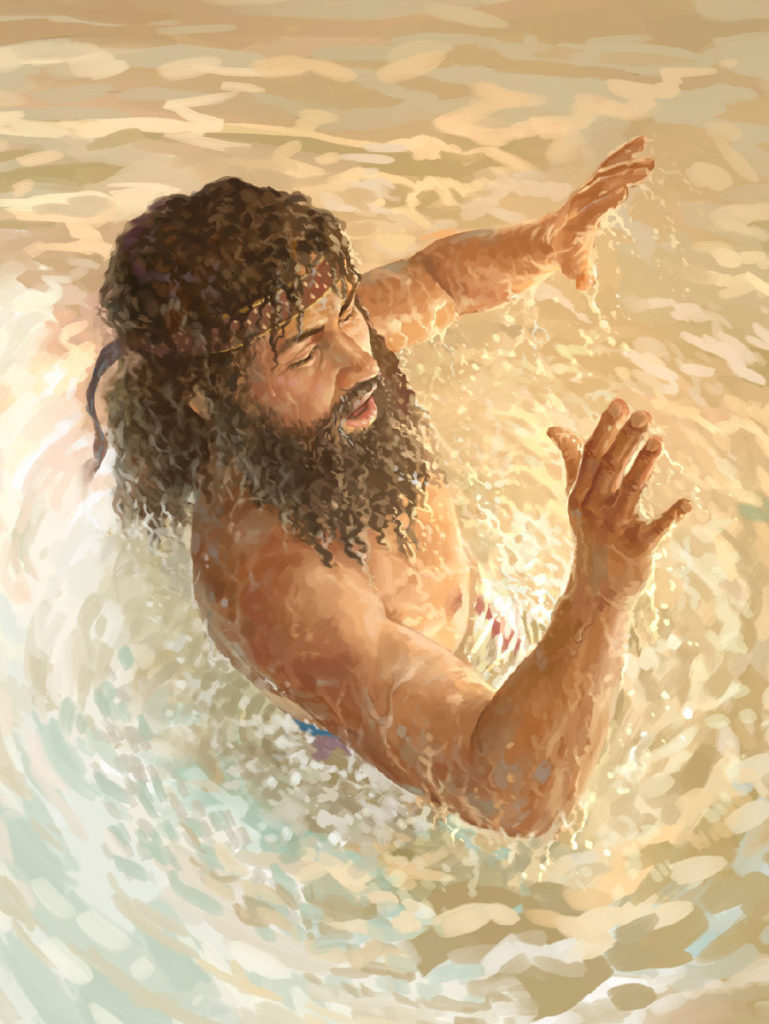This is such a well-worn Sunday-school staple we easily overlook its relevance for grownups. And that may be the point: a little girl suggests a solution, a great man’s diseased skin becomes as clear as a child’s. Unless we become as little children we can’t be cleaned. We can’t come into the kingdom whose gates the Syrian captain almost passed by.
To begin with, it’s a little gem of storytelling: like Ruth, an almost ahistorical tale set between historical records of faithless kings and ruthless usurpers. It has the outlines of a folk tale: neither of the kings of Israel or Syria are named, and Naaman is not mentioned elsewhere in the Old Testament. Gehazi, a nobody, emerges as a kind of trickster character who gets his comeuppance. None of this means that the story is untrue, but that (again, like Ruth) it has redemptive echoes fulfilled in the New Testament.

The setup is the “mighty man of valor,” a successful and respected commander who is nevertheless brought low by a shameful disease. A humble servant girl, captured in a raid against Israel, suggests Elisha the prophet, well known for his miraculous powers. It’s worth a try, and Naaman’s king, who values him greatly, loads him up with gifts for the prophet and the prophet’s sovereign. In their world, you pay for what you get: the greater the goods, the greater the recompense.
A bit of comic relief when the king of Israel, Naaman’s first stop, misunderstands the request. “Am I God? I can’t cure this man—it’s a trap!” Elisha, hearing of this melodramatic display, probably rolls his eyes before setting the King straight.
So Naaman, with all his pomp and pathetic skin, stands outside the prophet’s house expecting . . . what? A personal audience at least, given his station. And probably an elaborate healing ritual with chants and offerings and ceremonial smoke and mirrors, all of which might even work. Instead, he gets a curt message by Elisha’s servant Gehazi.
The medium and the message seem not only demeaning but carless, as if the prophet had just tossed out his first though. No wonder Naaman is insulted and upset. His fuming seems perfectly natural: I came all this way with all this gold, and this is my answer? I should have just stayed home and taken a bath.
His servants intervene. We might infer here that Naaman was a just man as well as a great commander, as his servants seem genuinely concerned for him. “My father” might have been a common form of address from servant to master, but it implies a warmth that “Sir” or “My Lord” do not. Anyway, they make an interesting argument.
Most translations put it this way: “If the prophet had told you to do something great, would you not have done it?” That is, “You were prepared for a grand task; would it hurt to perform a simple one?”
The ESV, alone of the major translations, reads like this: “It is a great word that the prophet has spoken to you; will you not do it? Has he actually said to you, ‘Wash and be clean’?”
I can’t say which translation is more correct, but I like the ESV’s because the focus is not on the procedure, but the reward. Not on what Naaman does, but what God will do. “Master Naaman, didn’t you hear what he promised you? ‘Wash and be clean’? That’s a great thing—just do it, already!”
So he does. He “goes down,” or humbles himself to wade into the dirty water, dips himself to the number of completeness, and comes out as a little child—clean.
Now his gold is a gift of gratitude, not payment, but Elisha (meeting him face to face this time) won’t take it. Cleansing is free. Redemption is literally priceless. Gehazi doesn’t see that—all he sees is carnal opportunity. What he does seems harmless, and even clever; he’s just taking the opportunity to skim a little off the top. But his crime is similar to that of Simon Magus in Acts 8:29: seeking to turn God’s grace to his own advantage.
Elisha rebukes him: “Did not my heart go when the man turned from his chariot to meet you? Was it a time to accept money and garments?” There may be a time for remuneration, when a worker is worthy of his hire, but this isn’t it. Grace can’t be hired, because no one has the means to pay for it.
Except Jesus. He mentioned Naaman the Syrian (Luke 4:27) as an example of his Father’s sovereign grace: lavish, unexpected, and absolutely free. It’s a gift only he could purchase, only he could give. And it’s a great thing. Will you not unfold your stubborn arms, uncurl your clenched fist, and receive it?


This is one of my favorite stories in the OT. I wish someone would make a movie out of it. (I mean an accurate one.)